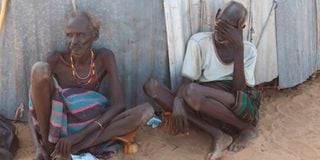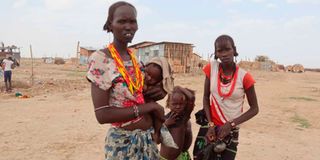Premium
Relief food a lifesaver for Turkana North residents

Janle Herogalie,60, (left) and Lomalinga Dergich,58, (right) during an interview with the ‘Nation’ in Kerech village, Ileret Ward on April 1.
It is 11am on Thursday, April 14. More than 100 residents arrive at Ileret chief’s camp in North Turkana, full of anticipation. While men sit on their stools, mothers sit on the hot sand as some try to comfort their wailing, sweating, hungry and thirsty babies. Some have carried jerrycans, hoping to get water.
Bulo Marsa, 25, is here, hoping to get relief food for her three children. With no education, she has a fair grasp of Swahili, so she narrates her story.
She got married at 17 and depends solely on her husband for food. He, in turn, depends on livestock, most of which have died in the drought. When livestock were in good health and in plenty, her husband would sell them at a market in Ethiopia.
“My eldest child is eight years old, the second is aged seven, and the youngest is three. Because of lack of food, I had to wean him early. We no longer have livestock, save for a few goats, so I have resorted to fetching and selling water or firewood to buy food,” says Bulo.
“We sleep hungry at least twice a week. Whenever I get some money, I buy flour and make very thick porridge for breakfast, then ensure there’s some left for supper. If it’s not enough, I let the children have it for supper, then prepare strong tea for myself, or I sleep hungry,” she adds.

A woman breastfeeding her baby at Bubbua manyatta in Hare area Ileret ward Marsabit County on March 31, 2022.
She says she never got money through the cash transfer programme set up by the government, even though she was registered. She explains that most of the men and women at the camp had travelled far with their livestock to look for pasture and they had to return when their animals died.
Bulo says people have also died from the hunger. Mrs Lenges, her friend and neighbour, is among them. She was buried on February 1. Following her death, which left Ling’a Lenges a widower, their children left home to fend for themselves.
The 50-year-old’s eyes glisten with grief as he narrates how he was unable to get enough food for the love of his life in her last days. He is wearing an orange blazer, the only thing he has left of his wife.
“Before my wife died, she had stayed hungry for a week, and even when I went to beg for food from neighbours, it was never enough. On the day she died, we were together in the house, and I watched her breathe her last,” he says. “I have no wife to care for me. The drought is still here, and I sometimes have to go to people’s houses to beg for food. Sometimes, my neighbours sympathise with me and invite me for a meal. Since her death, I have been unable to sleep. I also wish I could die,” he says. Whenever he receives relief food, he takes it home and asks his daughter, who is married and lives nearby, to cook for him. She invites him often, and when she has nothing, Lenges goes to bed hungry. With no phone, he says he has not been registered for the government cash transfer programme.

Yierat Ajanle, 11, walks around their hut in Kerech village on April 1.
“The blazer I have on is the one my wife wore in her last days, especially when she felt cold. I didn’t want anyone else to have it, so I took to wearing it. When I am stressed and look at it, I remember her and the memories we created, and feel lighter at heart,” he says. For 45-year-old Mabeta Habara, tragedy struck her family in 1999 when her husband died, leaving her with two children. She ended up being inherited by her brother-in-law. She had six more children with him.
Having inherited more than 30 cattle and about 100 goats and sheep, she found solace in the knowledge that her children would never lack.
“Our livestock never lacked pasture. They were well fed, produced a lot of milk. We had plenty of meat. My brother-in-law helped feed the children. Now, all pasture is gone, I have no cattle except a few goats, and my brother-in-law can no longer provide,” she says.
To make a living, Mabeta fetches and sells water and reeds used to build manyattas.
“I think we overgrazed our livestock on the land, and when the drought came, they couldn’t get anything to feed on, and they died. Last year, we lost so many livestock that the air stank of death,” she says.
At home, 15 mouths wait on her. Seven of those are her five grandchildren from her two eldest sons, and their mothers. A ration that would provide two meals for Bulo is only enough for a single meal at her house. However, she doesn’t regret being inherited, or bearing more children.
“I wanted more children. Besides, I can’t live with regret because it has already happened. The children are here already,” she says. On the morning of the interview, she left home aware that she needed to get something or else her family would sleep hungry.
“Even though I get Sh3,000 from the government cash transfer programme, it doesn’t last. I buy food, which, because of our large family, only lasts about a week. We then have to wait for another two months before we get more,” she says. “We still depend on the government. We hope they never tire of feeding us. We only wish that the government would raise that amount to about Sh20,000 to enable us to sustain our large families,” she says.





